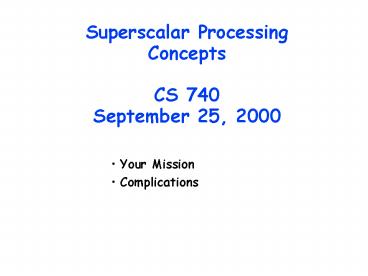Superscalar Processing Concepts CS 740 September 25, 2000 - PowerPoint PPT Presentation
1 / 11
Title:
Superscalar Processing Concepts CS 740 September 25, 2000
Description:
Example: program that executes 1 Billion instructions. 5-stage pipeline: 1,000,000,000 cycles ... Register renaming. advantages? Dependences in the memory system ... – PowerPoint PPT presentation
Number of Views:20
Avg rating:3.0/5.0
Title: Superscalar Processing Concepts CS 740 September 25, 2000
1
Superscalar ProcessingConceptsCS 740September
25, 2000
- Your Mission
- Complications
2
Your Mission
- Design a single processor that will achieve a
millionfold speedup over our simple 5-stage
pipeline. - Example program that executes 1 Billion
instructions - 5-stage pipeline 1,000,000,000 cycles
- new processor 1,000 cycles
3
What About Superpipelining?
- I.e. what if we design a 5,000,000 stage pipeline?
4
How Many Functional Units?
- How many instructions are executing at once?
5
What About Branches?
- Roughly 1 out of every 6 instructions is a
conditional branch. - How do we look far enough into the future?
6
Branch Prediction
- Two Parts
- (1) what is the target address?
- (2) will the branch be taken or not?
7
Executing Beyond Unresolved Branches
- What if we execute instructions that never should
have been executed in the first place? - What about their side-effects?
- This is called control speculation.
8
What about Data Dependences?
- Register renaming
- advantages?
- Dependences in the memory system
- letting non-dependent loads go ahead of writes
- what if the load does depend on the write?
- Data dependence speculation
- Value prediction
9
Memory Hierarchy
- How many ports on the caches? Main memory?
- Instructions and data?
- How can we fetch so many things in parallel?
- Non-blocking loads, prefetching
10
Registers
- How many registers do we need?
- How will this work?
- Renaming, etc.
11
Exceptions
- How can we maintain precise exceptions?
- Can we isolate the right instruction in one
cycle? - How quickly do we need to react to exceptions?
- Can we leverage mechanisms from speculation?
- How does this compare with branch speculation?































